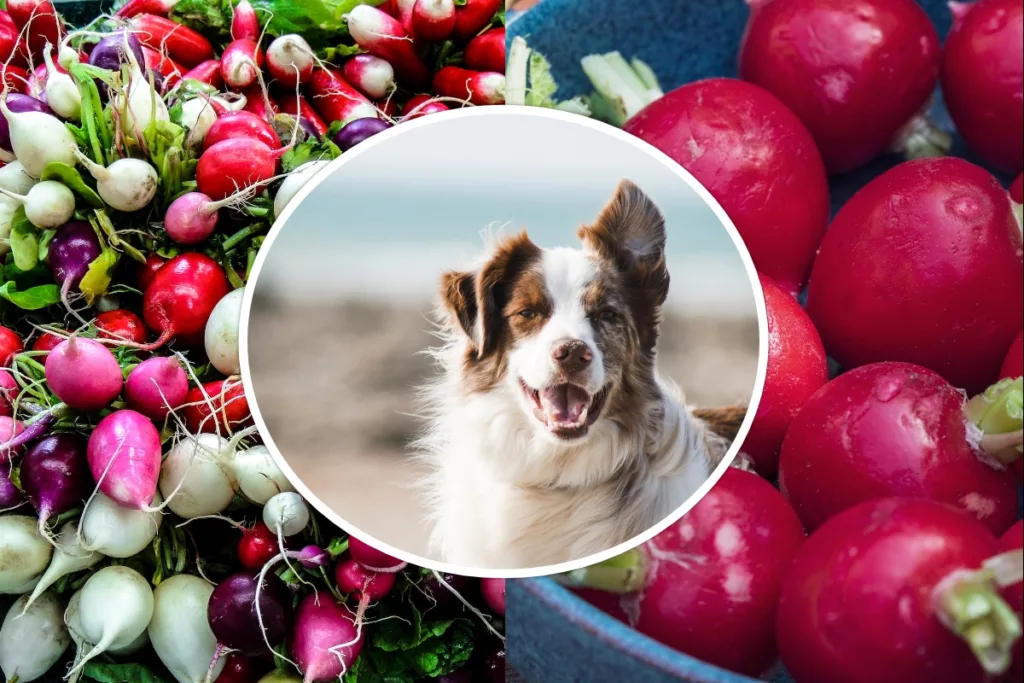Can dogs eat radishes? You want to give your furry friend a new crunchy treat, or your dog already tried a radish and you’re worried if it’s safe. Well, the answer is yes, dogs can eat radishes! Radish is a root vegetable that comes in different shapes and sizes, and it’s safe for dogs as long as they eat it in moderation.

Table of Contents
Are Radishes Good for Dogs?
Radishes are not only safe for dogs, but they can also be good for them! Dogs can eat radishes and even get some nutritional benefits from this healthy vegetable.
Radishes are high in fiber, like many other vegetables. They also have protein, vitamin C, and B vitamins like riboflavin, niacin, folic acid, and B6.
Radishes are also rich in minerals like manganese, magnesium, and calcium. Some radishes even have a little bit of Omega-3 and Omega-6 fatty acids. Isn’t that cool?
Radishes also contain something called phytonutrients, which are good for us and dogs. Red radishes have anthocyanins, which can help improve brain function and fight inflammation and cancer. Radishes also have potassium and vitamin K, which are important for our health.
Including small amounts of radishes in your dog’s diet can help them manage their weight. The fiber in radishes makes dogs feel full and helps with their digestion, whether they have diarrhea or constipation. It can even help overweight dogs and those with diabetes.
Chewing on the crunchy part of radishes can also benefit a dog’s dental health. It helps remove plaque from their teeth, like when we brush our teeth!
Are Radishes Bad for Dogs?
No, radishes are not bad for dogs. They are safe and non-toxic treats for them. But, it’s important to give radishes in moderation.
Remember, treats should not make up more than 10 percent of your dog’s diet. Even if your dog eats a raw diet, most of their meals should consist of meat. Dogs need certain amino acids that are not found in plants, including radishes.
Feeding too many vegetables to your dog can upset their digestion and make them feel gassy, bloated, and uncomfortable. So it’s best to introduce dietary changes and consult your vet or a nutritionist before making any big changes.
Be aware that whole radishes can be a choking hazard for dogs. Some dogs might chew on them for a long time, while others might try to swallow them whole. It’s better to cut or chop radishes before giving them to your dog. You can also blend or boil them to make them easier to digest.

Can Dogs Eat Radish Leaves?
Radish leaves are a bit too spicy for dogs, even spicier than the radish itself. They can have a warming effect on a dog’s digestive tract, so it’s best to avoid giving them to your furry friend.
But, if your dog likes radish sprouts, you can give them a small amount. Soak radish seeds in water, and after a few days, when they sprout, you can offer your dog these tender sprouts. Sprouts have digestive enzymes and nutrients that mature vegetables don’t have.
Can dogs eat Wild Radishes?
Hey there! Let’s talk about wild radishes. Have you ever heard of them? Well, if you’re a dog owner, it’s important to know what your furry friend can and can’t eat.
Dogs can be curious and eat things that aren’t good for them. But when it comes to radishes, there’s good news!
Radishes are crunchy vegetables that people often put in salads. They have a spicy and crunchy taste. And guess what?
Dogs can eat radishes too! But wait, there’s a catch. It’s important to give radishes to dogs in moderation. That means not too many, a little bit.
Radishes are a safe and healthy treat for dogs. They can be a fun reward for good behavior. And unlike some dog treats, radishes don’t have any harmful stuff added to them. They are low in calories, which is great for dogs that need to watch their weight.
Not only are radishes tasty, but they are also good for dogs. They have lots of nutrients that can help keep them healthy. So, if you ever want to give your dog a crunchy snack, you can try giving them a radish. Remember, a little bit is enough!
But always check with your parents or a grown-up before giving your dog any new food. They can make sure it’s safe and okay for your furry friend.
Should Dogs Eat Radishes?
Feeding radishes to dogs is safe and can be a treat, but there are a few reasons why they might not be the best food for dogs.
Radishes don’t have much nutritional value compared to other greens and broccoli. Dogs produce their vitamin C, so they don’t need it from their food. Radishes are best enjoyed in small amounts, and their main benefit for dogs is the fiber they provide.
Many dogs don’t like the taste of radishes because they have a distinctive flavor. They might prefer other treats instead.

How to Give Radishes to Your Dog
If you decide to give radishes to your dog, remember to do it in moderation to prevent stomach problems. You can grind or sprinkle radishes on your dog’s wet or dry food to add flavor and texture. Another idea is to cut radishes into small pieces and freeze them. It makes a refreshing and crunchy snack for your dog!
But always remember, dogs need a diet based on protein, so don’t give them too many vegetables. And before adding radishes or any other new food to your dog’s diet, it’s a good idea to talk to your veterinarian.
Summary: Can Dogs Eat Radishes?
So, can dogs eat radishes? Yes, they can! Radishes are safe for dogs to eat, but it’s best to give them in moderation. Radishes can have some nutritional benefits for dogs, but they are not essential to their diet.
If your dog likes radishes, you can offer them as a frozen treat or mix them with their food. Remember to always rank a protein-based diet for your furry friend and consult your vet for advice on their specific needs.
References: Life and pets, Are radishes good for dogs from American Kennel Club
Related Posts
- Can dogs eat squash? Is squash safe for dogs?
- Can cats eat cheese? Is cheese good for cats? 3 kinds of cheese that cats can eat
- Why do cats cover their face when they sleep?
- Can dogs drink milk? What about almond milk? 3 types of milk
- Can Dogs Eat Tortillas? Are tortillas safe for dogs?
- Can Dogs Eat Cabbage? How much cabbage is safe to give your dog?